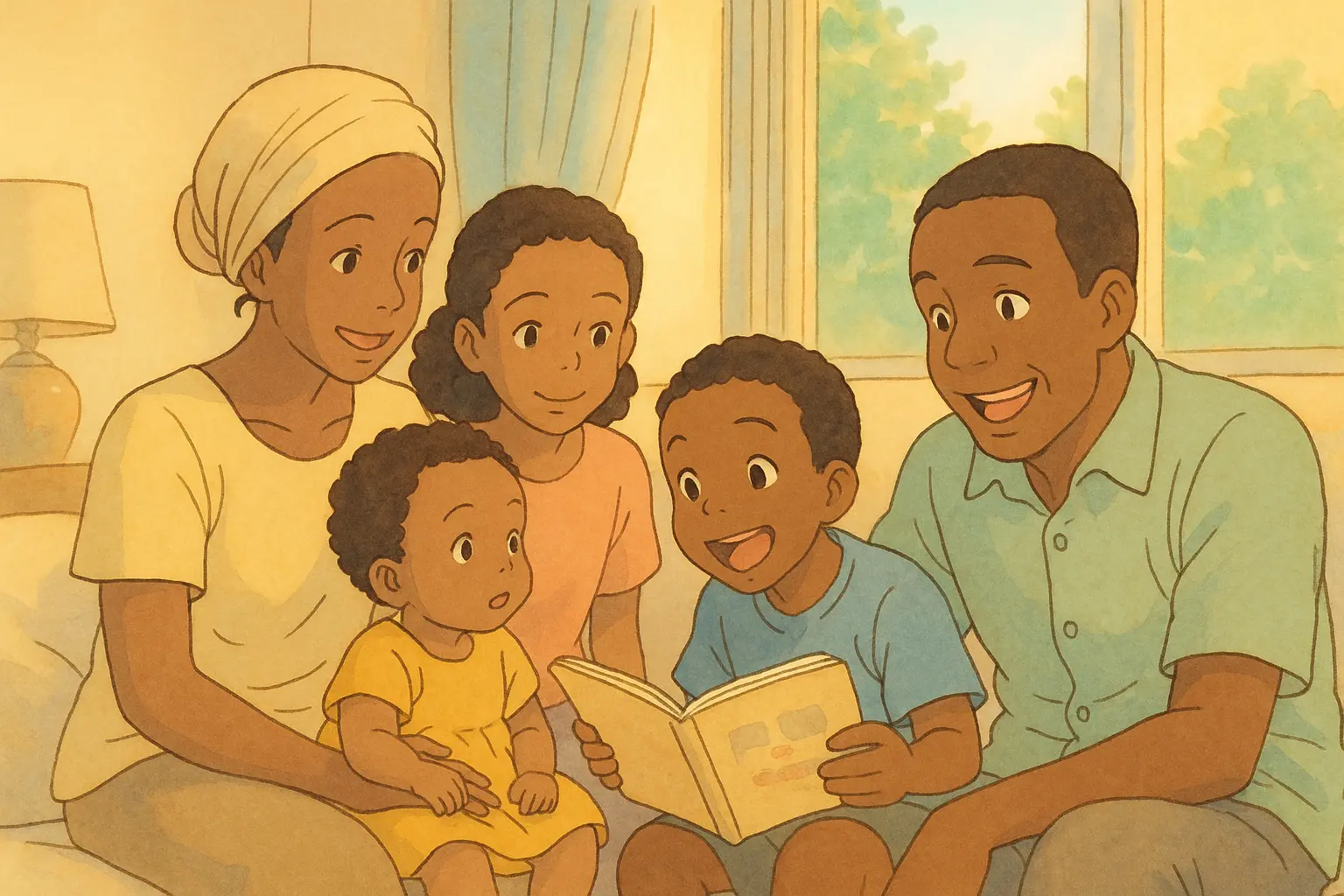By Lionel Kubwimana
••8 min read
Is your younger child picking up languages faster than your older one? Learn why this happens and how to support both kids without creating rivalry.

Have you noticed your second child picking up languages way faster than your first? You're not alone. Many African families living in the US see this happen, and it can be both amazing and confusing.
Take the Mbaye family from Minneapolis. They moved from Senegal hoping to raise their kids speaking both Wolof and English. But little Amina, their second child, surprised everyone. She was speaking both languages clearly while her older brother Lamin was still struggling with simple words.
Sound familiar? This happens in African families across America. Your younger child might be chatting away in English, Swahili, or Yoruba while your older one is still catching up.
But here's the thing – this isn't about one child being "smarter." It's about how families work and how kids learn from each other. Understanding why this happens can help you support both children without creating competition or hurt feelings.
Let's explore why your second child might be learning faster and what you can do to help both kids succeed.
Your second child grows up hearing more talking than your first did. Think about it:
When your first child was little, the house was probably quieter. But by the time your second arrives, there's constant conversation happening. Your younger child hears words, sentences, and different ways of speaking all day long.
This is like living in a language school without even trying.
Your older child naturally becomes a teacher without meaning to. Here's how:
Kids often learn better from other kids than from adults. Your second child gets this benefit every single day.
Let's be honest – by your second child, you're not as stressed about every little thing. You know what works and what doesn't. This makes a big difference because:
When parents are relaxed, kids learn better. It's that simple.
Your younger child sees their big sibling talking, playing, and getting attention for using words. They want to join in! This motivation pushes them to learn faster so they can:
When your second child learns faster, some wonderful things happen:
Stronger Family Bonds
Cultural Connections
Natural Learning
Older Child Feeling Left Behind Your first child might feel sad or frustrated if everyone keeps talking about how fast the little one is learning. They might think:
Unfair Comparisons It's easy to accidentally compare your kids by saying things like:
These comments hurt, even when you don't mean them to.
Make sure both kids get praise for their efforts:
Quick Tip: Keep a simple notebook where you write down one thing each child did well that day. Read it back to them at bedtime.
Instead of making it a competition, make it teamwork:
Easy Activity: Start a family word jar. Every time someone learns a new word in any language, write it on paper and put it in the jar. Once a week, pick words and use them in silly sentences together.
Help your older child feel important by giving them special roles:
This makes them feel valuable while still helping the younger one learn.
Every child is good at different things:
Remember: Language learning is just one skill. Your children have many gifts.
Build activities that bring everyone together:
These traditions help both children connect with their heritage while practicing language skills.
Sometimes you might need support beyond what you can do at home:
Every child learns at their own pace. Your job isn't to make them the same – it's to help each one grow in their own way.
Ask them:
Instead of big, scary goals, try:
Supporting both your children's language learning isn't just about words. It's about:
Identity: Helping your kids know who they are and where they come from
Confidence: Teaching them that being different is a strength, not a problem
Family Bonds: Creating connections that will last their whole lives
Future Success: Giving them skills that will help them in school, work, and relationships
Cultural Legacy: Keeping your heritage alive for the next generation
This Week: Start one simple daily activity, like playing music from your home country during breakfast
This Month: Have a family meeting about language goals and let each child share what they want to learn
This Year: Plan a trip to a cultural event or visit family where your kids can practice their languages
Remember Always: Both your children are amazing in their own ways. Your job is to nurture what makes each one special.
Watching your second child learn languages faster than your first can bring up lots of feelings. You might feel proud, worried, confused, or all of these at once. That's totally normal.
The most important thing to remember is this: both your children are on their own unique journeys. Your younger child learning faster doesn't mean your older child isn't smart or capable. It just means they're different people with different strengths.
Your role as a parent is to cheer them both on, create opportunities for them to grow, and help them support each other. When you focus on building a loving, language-rich home where everyone feels valued, amazing things happen.
Your children will not only learn to speak multiple languages – they'll learn to love their heritage, support their siblings, and feel confident in who they are. And isn't that what we all want for our kids?
Start small, be patient with yourself and your children, and remember that every family's language journey looks different. You're doing better than you think, and your kids are lucky to have parents who care so much about their growth and connection to their roots.
The fact that you're reading this article shows you're the kind of parent who wants the best for both children. Trust yourself, celebrate your family's uniqueness, and enjoy watching both your kids grow into confident, multilingual, culturally-connected people.
You've got this!